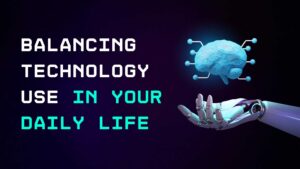Balancing Technology Use in Your Daily Life For Amazing Lifestyle In 7 Steps


In today’s world, technology has become an integral part of our lives, influencing the way we work, communicate, and entertain. Advances in technology offer many benefits, such as increased efficiency and connectivity, but when used excessively, they can have negative effects such as decreased productivity, strained relationships, and mental health issues. Balanced use of technology is essential to take advantage of its advantages and reduce its disadvantages. Here are some strategies to maintain a healthy relationship with technology in your daily life.
Table of Contents
Set Clear Boundaries
It’s important to set clear boundaries around technology use. Define specific times to use and avoid using digital devices. For example, set a “technology-free” time, such as during meals or an hour before bed, so you can relax and engage in other activities. Setting these boundaries will prevent technology from invading every aspect of your life.
Prioritize Face-to-Face Interactions
Technology facilitates communication, but it cannot replace face-to-face interaction. Prioritize spending time with family and friends without being distracted by digital devices. Face-to-face conversations foster deeper connections and increase emotional well-being. Plan regular social activities that require face-to-face interaction, such as dinner with family or an outing with friends.
Practice Careful Use of Technology
Mindfulness means being fully present and aware of what you are doing in every moment. Apply this concept to your technology use by consciously thinking about how and why you use your digital devices. Avoid mindlessly scrolling through social media or constantly checking emails and notifications. Instead, use technology intentionally for purposes such as work, study, and entertainment, and take breaks to reflect on your usage habits.
Build a Productive Work Environment
Depending on how you use technology, it can either increase your productivity or decrease your productivity. To maintain a productive work environment, minimize distractions by turning off unnecessary notifications and using productivity tools that help you stay focused. Set up a dedicated workspace free from the distractions of technology such as social media, and set specific working hours to prevent technology from blurring the line between work and personal time.
Participate in Physical Activity
The use of balancing technology also includes incorporating physical activity into daily life. Regular exercise is very important for physical and mental health and provides a much-needed break from screen time. Whether you go for a walk, practice yoga, or exercise, physical activity can help reduce the negative effects of prolonged technology use, such as eye strain and sedentary behavior.
Cultivate Offline Hobbies
Develop hobbies and interests that aren’t related to technology. Activities like reading, cooking, gardening, and crafting can provide a refreshing break from digital screens and contribute to a more balanced lifestyle. Offline hobbies encourage creativity, reduce stress, and provide opportunities for personal growth and fulfillment.
Educate Yourself and Your Family
It’s important to understand the impact of technology on you and your family’s life. Educate yourself and your family about the potential risks of excessive technology use, including: B. Addiction and decreased attention span. Discuss and implement strategies together to ensure everyone maintains a healthy balance. It is especially important to set a good example and model balanced use of technology for children.
Also Read: How to Start An Amazing Garden in a Small Space In 9 Steps
Conclusion
Using balancing technology in your daily life requires intention and discipline. Set clear boundaries, prioritize personal interactions, practice mindful use of technology, create a productive work environment, engage in physical activity, cultivate offline hobbies, and educate yourself and your family. By doing so, you can enjoy the benefits of technology without letting it control your life. . Achieving this balance increases your overall happiness, strengthens your relationships, increases productivity, and leads to a healthier, more fulfilling lifestyle.




